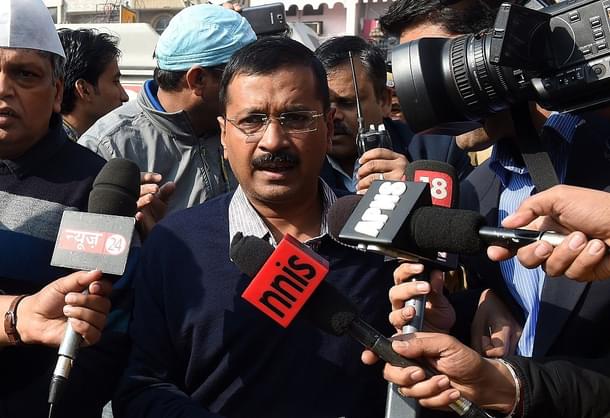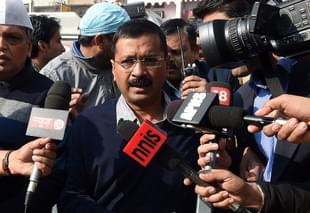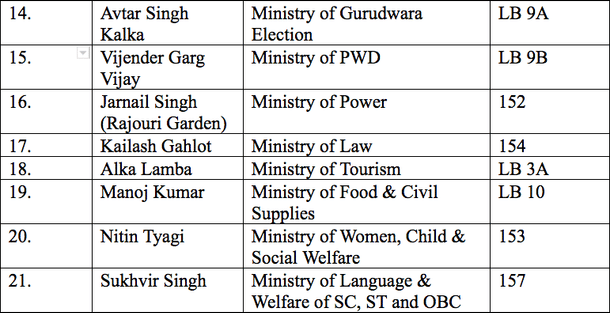Politics
Why Delhi Govt’s Parliamentary Secretary Appointments Are All Wrong
Surajit Dasgupta
Jun 16, 2016, 12:11 PM | Updated 12:11 PM IST
Save & read from anywhere!
Bookmark stories for easy access on any device or the Swarajya app.


- From constitutional requirements to High Court verdicts, they satisfy no condition
- Why do Delhi’s seven ministers need, on average, three parliamentary secretaries each?
Delhi’s Aam Aadmi Party government has been in the eye of a storm over the appointment of 21 principal secretaries since 14 June when the President refused to give his consent to the amendment to the Delhi Members of Legislative Assembly (Removal of Disqualification) Act, 1997, passed by the quasi-state’s Assembly. The party’s initial, speculative defence that the President might not have rejected the Bill of revision yet has been proven wrong by a Times Now report that showed Pranab Mukherjee’s signature on the relevant document during their prime-time debate that night.
The dispute relates to the office of profit law, specified in the Constitution under Article 102 (1)(A). According to the Act, a legislator (Member of Parliament or a Legislative Assembly) cannot simultaneously occupy another office from which he gets salary, perks and/or other benefits. If the AAP says that they had not been paying these parliamentary secretaries any salary, it is not good enough. The response to an RTI application has shown that the parliamentary secretaries are very well placed in offices of the Delhi government in these rooms of the Assembly:


Two other channels, NDTV and India Today, among possible others that I may have missed, went with their camera crews to these rooms and found the arrangements not just adequate to call them offices but also equipped with comfort and amenities no less than a minister is entitled to.
Why do they need these facilities? This brings us to the question as to what a parliamentary secretary is supposed to do. They are basically assistants of ministers. In countries like Australia, Canada, Ireland, Malaysia and the United Kingdom, their respective Constitutions provide for this post and the office bearers are not debarred from earning pecuniary benefits from these offices either.
There are two problems with the AAP government’s appointments:
One, if the parliamentary secretaries are supposed to just assist the ministers, nobody knows why, on an average, Delhi’s seven ministers need three assistants each, while the ratio is not as high as 1:3 in any other state. Haryana has 13 ministers and 4 parliamentary secretaries; Rajasthan has 25 ministers and 5 parliamentary secretaries and Karnataka has 34 ministers and 10 parliamentary secretaries. Other than Delhi, only Punjab has more parliamentary secretaries than it has ministers: 24 of its parliamentary secretaries assist 18 ministers. But even there, the ratio is not as high as it is in Delhi.
Two, while the Constitution of India does not provide for the post of a parliamentary secretary, some states that have these office bearers first created a law via Money Bills to facilitate these appointments and only then appointed the secretaries — whereas the AAP government appointed 21 secretaries first (March of last year), passed a non-Money Bill later (June 2015) and then sought to apply the exemption of this post — from the office of profit clause — with retrospective effect. Among the states that did make such a law…
- The Himachal Pradesh government was taken to task by the High Court in that state that said that the chief minister had no authority to make such appointments. The state government appealed to the Supreme Court against the verdict; the case has been pending before the apex court since 2005.
- A similar verdict was given by the Calcutta High Court, rejecting appointments of parliamentary secretaries by the West Bengal government last year. This state government’s appeal against the verdict has been pending before the Supreme Court since last year, too.
- The Goa Bench of the Bombay High Court similarly annulled the appointments by the Digambar Kamat government. The Goa dispensation of 2007-12 did not appeal against the verdict.
- The Punjab & Haryana High Court is still hearing the case against Punjab’s parliamentary secretaries.
- In no pending case above has the apex court agreed to issue a stay order on the execution of the High Court verdict.
- Given that three High Courts have taken exception to these appointments, it is unlikely that the highest court of the land will disagree with all of them. We say this without any intention to influence the outcome of the cases pending before the Supreme Court.
It is clearly nothing but an age-old tactic employed by parties, which the AAP government has employed, to keep such MLAs in good humour who cannot be accommodated in the Cabinet. Does this not mean that the party’s anti-corruption plank rings hollow, and that it finds it difficult to keep its flock together without throwing some crumbs of power at all and sundry?
The Arvind Kejriwal administration, in fact, makes the humouring act brazen. It went to the extent of providing Cabinet minister-like status to Ashish Khetan — who is not even an MLA — for being the Vice-Chairman of the Delhi Dialogue Commission. He enjoys a bungalow, free power, monthly salary and travel allowance — which only a minister is entitled to — while officially not being ranked as a minister.
Not only that, some of the volunteers braving the scorching Delhi sun during the odd-even scheme, checking whether any motorist is violating the rule, said to this correspondent that they were otherwise unemployed, but they got Rs 500 a day for their services for those 31 days: 15 in January and 16 in April. And they are all AAP’s activists. What a way to keep the cadre happy! Why wouldn’t they go all out in defending every scheme of the government, howsoever harebrained?
Finally, if the excuse for these appointments is that the parliamentary secretaries have been additionally given the charge of vigilance and that this requires these super-MLAs to have some authority, one may recall the AAP’s first stint in governance — a 49-day affair. The ‘vigil’ or ‘supervision’ included barging into labour rooms and operation theatres of hospitals in the middle of obstetric and surgical procedures. Is the Delhi government now seeking “authority” for its MLAs to conduct such raids? Since Somnath Bharti was the Law Minister in that government, and not a mere parliamentary secretary, was his midnight, racist raid on African-origin women in a neighbourhood of south Delhi authorised?
The 66 MLAs of AAP — its second Law Minister Jitender Singh Tomar was disqualified after his law degree proved fake — are well capable of looking after their respective constituencies just as MLAs in other states do without being parliamentary secretaries additionally. Chief Minister Kejriwal’s act of seeking to create these ill-conceived and unfounded government jobs is a sinister manner of addressing his folks’ greed for power and an attempt to institutionalise anarchy.





